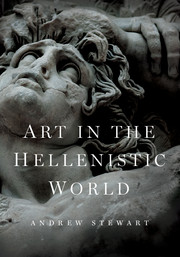Book contents
- Frontmatter
- Contents
- List of Illustrations
- Preface
- Introduction
- 1 Settlement
- 2 Power
- 3 Victory
- 4 Benefaction
- Focus I The Great Altar of Pergamon
- 5 Prowess
- 6 Wisdom
- 7 Piety
- 8 Desire
- Focus II Hellenistic Mosaics
- Appendix A The Artist
- Appendix B Kallixeinos of Rhodes on the Wonders of Alexandria
- Glossary
- Timeline
- Biographical Sketches
- Select Bibliography and Further Reading
- References
- Sources of Illustrations
- Index
6 - Wisdom
Published online by Cambridge University Press: 05 October 2014
- Frontmatter
- Contents
- List of Illustrations
- Preface
- Introduction
- 1 Settlement
- 2 Power
- 3 Victory
- 4 Benefaction
- Focus I The Great Altar of Pergamon
- 5 Prowess
- 6 Wisdom
- 7 Piety
- 8 Desire
- Focus II Hellenistic Mosaics
- Appendix A The Artist
- Appendix B Kallixeinos of Rhodes on the Wonders of Alexandria
- Glossary
- Timeline
- Biographical Sketches
- Select Bibliography and Further Reading
- References
- Sources of Illustrations
- Index
Summary
Like all traditional societies, the Greeks greatly prized wisdom (sophia). Achilles, Ajax, Agamemnon, and their cohorts had needed wise (and garrulous) old Nestor to steer them through the long siege of Troy, and always came to regret it when they ignored him. Yet it took the wisdom of a poet to immortalize their deeds as a lesson for the ages. Without Homer (see Figures 74–75), they were all destined for oblivion.
By the Hellenistic period, the increasing complexity of Greek society had greatly expanded the roster of the wise. It now included philosophers, wellsprings of wisdom on everything from cosmology to ethics to kingship theory; politicians and orators, farsighted counselors to the city; historians, discerning analysts of events past and present; doctors, expert decoders of the mysteries of the body; and even a sculptor, Pheidias, peerless interpreter of the majesty of the gods (see Figure 167).
All these “worthies” (as the eighteenth century would later call them) could be rewarded with honorary portraits for their services, specially commissioned by their pupils, followers, clients, cities, and even by the kings. Usually they were of bronze, but very occasionally (especially if the honoree was actually given cult for some divine spark that presumably inspired him) of marble. Such portraits both memorialized these individuals as civic benefactors and literally put them on a pedestal as shining examples of the particular brand of wisdom that they personified.
- Type
- Chapter
- Information
- Art in the Hellenistic WorldAn Introduction, pp. 133 - 153Publisher: Cambridge University PressPrint publication year: 2014



